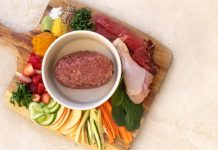The Quest for Nutritious Dog Food Alternatives
Every dog owner knows the importance of providing their furry friend with the best nutrition possible. But what happens when you run out of their regular dog food, or you’re simply looking for a healthier, more natural alternative? The world of dog nutrition is vast, and understanding what’s best for your pet can sometimes feel overwhelming. This guide aims to shed light on the nutritious alternatives to commercial dog food, ensuring your dog remains happy, healthy, and well-fed.
The Reality of Running Out of Dog Food
It’s a situation many pet owners dread: opening the cupboard to find an empty dog food bag. Whether it’s due to a delayed delivery, a store running out of stock, or simply forgetting to pick up a new bag, running out of dog food can be a cause for concern. After all, our pets rely on us for their well-being.
Ordering dog food online has become a popular solution for many. With the convenience of home delivery and a wide range of brands available, it’s no wonder many are turning to online suppliers. However, even with the best planning, there’s no guarantee of timely delivery. Setting up an “auto-delivery” can be a lifesaver, ensuring you never run out. But always allow for potential delays, ordering a week in advance to avoid any hiccups.
Switching Brands: What You Need to Know
Brand loyalty is common among dog owners. Once we find a brand that our dogs love and that meets their nutritional needs, we tend to stick with it. However, there might be times when switching becomes necessary, be it due to availability issues, dietary needs, or simply wanting to try something new.
If you’re considering a switch, it’s crucial to transition gradually. A sudden change can upset your dog’s stomach. Start by mixing a small portion of the new food with their current one, increasing the new food’s quantity daily. This slow transition helps their digestive system adjust. And always, before making a significant switch, consult with your vet to ensure the new brand meets all your dog’s dietary requirements.

Human Foods as Dog Food Substitutes
While commercial dog food is formulated to meet all of a dog’s nutritional needs, several human foods can serve as suitable substitutes in a pinch. These foods are not only nutritious but also readily available in most kitchens.
Lean Proteins: Chicken (without bones or skin), turkey, and lean beef are excellent protein sources for dogs. Ensure they’re cooked without any added spices or sauces.
Complex Carbohydrates: Brown rice, quinoa, and oats can provide your dog with the energy they need. They’re also gentle on the stomach, making them perfect for dogs with sensitive digestion.
Vegetables: Carrots, green beans, and peas are packed with essential vitamins and minerals. They can be served cooked or raw, but always ensure they’re cut into bite-sized pieces to prevent choking.
Remember, while these foods can act as substitutes, they shouldn’t replace commercial dog food in the long run. Always aim for a balanced diet to ensure your dog gets all the nutrients they need.
Safe Fruits and Vegetables for Dogs
Fruits and vegetables can be a delightful treat for dogs, offering both nutrition and variety. However, it’s essential to know which ones are safe.
Fruits: Apples (seeds removed), bananas, and blueberries are dog-friendly fruits. They’re rich in vitamins and can be given as occasional treats.
Vegetables: Broccoli, Brussels sprouts, and spinach are packed with nutrients. However, they should be given in moderation as they can cause gas in some dogs.
Always introduce new foods slowly and monitor for any allergic reactions or stomach upsets. And remember, while fruits and veggies are healthy, they should complement their primary diet, not replace it.
Dairy and Dogs: What’s Safe?
Dairy products can be tricky for dogs. While some can tolerate them, others might be lactose intolerant, leading to stomach upsets.
Yoghurt: Plain yoghurt, especially those with live cultures, can be beneficial for dogs. It aids in digestion and provides essential calcium.
Cheese: Hard cheeses like cheddar or gouda can be given in small amounts. However, always opt for low or reduced-fat versions to prevent weight gain.
It’s essential to note that not all dairy products are suitable for dogs. Milk, for instance, can cause diarrhoea in lactose-intolerant dogs. Always introduce dairy slowly and in small amounts, monitoring your dog for any adverse reactions.
Dangerous Foods: What to Avoid
While many human foods are safe for dogs, there are several that can be harmful or even fatal. Being aware of these can prevent unintentional harm to your beloved pet.
Chocolate: A well-known toxin for dogs, chocolate contains theobromine, which can lead to various health issues, including heart problems.
Grapes and Raisins: The exact cause is unknown, but even small amounts can lead to kidney failure in dogs.
Onions and Garlic: These can destroy a dog’s red blood cells, leading to anaemia. This includes all forms – raw, cooked, and powdered.
Xylitol: Found in many sugar-free products, xylitol can lead to liver failure and can be rapidly fatal.
Alcohol: Even small amounts can cause significant intoxication in dogs, leading to various health issues.
Always keep these foods out of your dog’s reach and be vigilant about what they might find on the ground during walks.
Homemade Dog Food Recipes
For those looking to take a more hands-on approach to their dog’s nutrition, homemade dog food can be a rewarding endeavour. Here are some simple recipes to get you started:
Chicken and Veggie Delight
- Ingredients: Boneless chicken, carrots, peas, brown rice.
- Method: Boil the chicken until cooked through. Cook the rice separately. Mix with boiled carrots and peas. Serve cool.
Beef and Quinoa Bowl
- Ingredients: Lean beef, quinoa, broccoli, flaxseed oil.
- Method: Cook the beef thoroughly. Prepare the quinoa as per instructions. Mix beef, quinoa, and steamed broccoli. Drizzle with a bit of flaxseed oil for an omega-3 boost.
Remember, while homemade dog food can be nutritious, it’s essential to ensure a balanced diet. Consult with a vet to ensure your recipes meet all your dog’s dietary needs.
Conclusion: Prioritizing Your Dog’s Health and Nutrition
Dogs are more than just pets; they’re family. Ensuring they receive the best nutrition is paramount for their well-being. Whether you’re using commercial dog food, human food substitutes, or homemade recipes, the goal remains the same: a happy, healthy dog. Always stay informed, consult with professionals, and prioritize your dog’s unique needs.
Frequently Asked Questions (FAQs) about Dog Nutrition and Food Alternatives
1. Can I feed my dog only human food?
While some human foods are safe and nutritious for dogs, it’s essential to ensure a balanced diet. Relying solely on human food might lead to nutritional deficiencies.
2. How often should I introduce new foods to my dog’s diet?
Introduce new foods slowly, one at a time, and monitor for any allergic reactions or stomach upsets. This allows you to identify any foods that might not agree with your dog.
3. Are there any grains dogs should avoid?
While most grains are safe for dogs, some, like wheat, can cause allergies in certain dogs. Always consult with a vet if you’re unsure.
4. Can I give my dog fish?
Yes, fish like salmon and tuna are excellent protein sources. However, ensure they’re cooked and boneless to prevent any choking hazards.
5. Why is chocolate dangerous for dogs?
Chocolate contains theobromine, toxic to dogs. Even small amounts can lead to serious health issues, including heart problems.
6. How can I ensure my homemade dog food is balanced?
Consult with a veterinarian or a pet nutritionist. They can guide you on the right proportions and ingredients to ensure a balanced diet.
7. Are raw diets good for dogs?
Raw diets, or BARF (Biologically Appropriate Raw Food), have their proponents. However, they can also pose risks like bacterial infections. It’s essential to research thoroughly and consult with a vet.
8. Can dogs eat eggs?
Yes, eggs are a great protein source for dogs. They can be fed boiled, scrambled, or even raw. However, if feeding raw, ensure the source is trustworthy to avoid salmonella.
9. How do I know if my dog has a food allergy?
Symptoms can include itching, redness, ear infections, and gastrointestinal issues. If you suspect a food allergy, consult with a vet for proper diagnosis and guidance.
10. Are there any benefits to rotating my dog’s diet?
Rotating foods can provide a variety of nutrients and prevent allergies from developing due to prolonged exposure to a single food source. However, always introduce new foods gradually.




